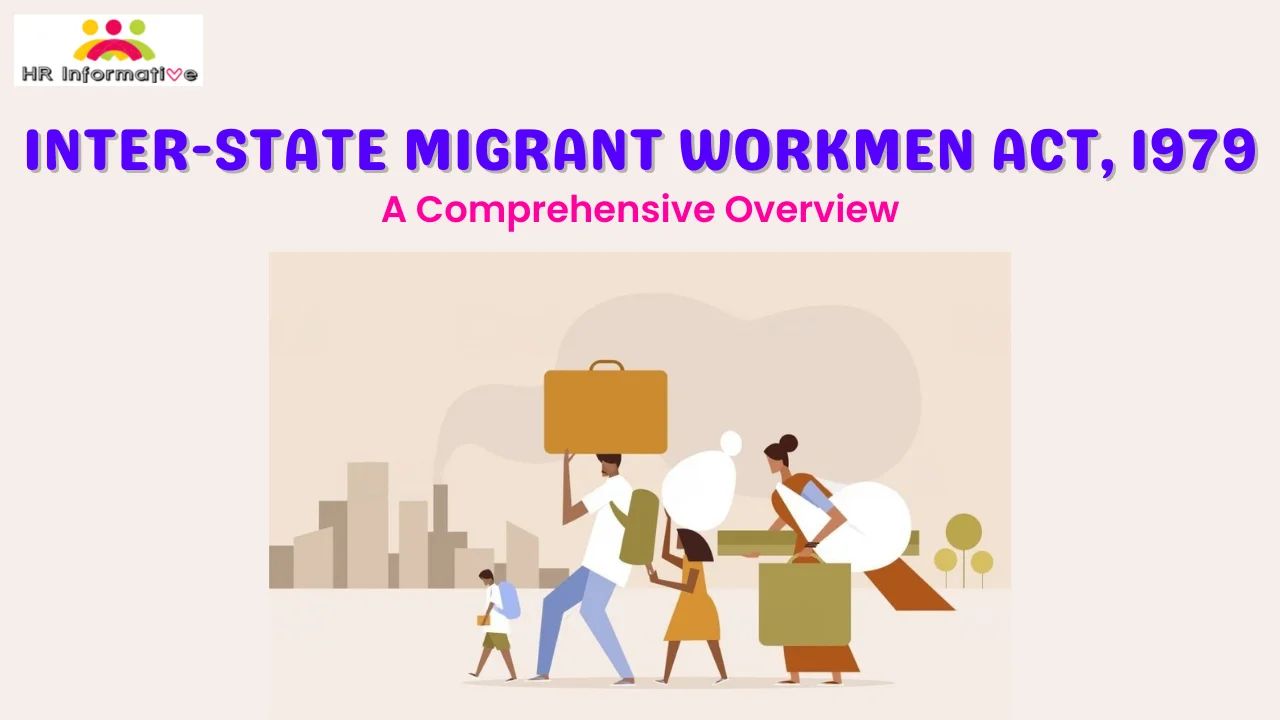Introduction
The Inter-State Migrant Workmen (Regulation of Employment and Conditions of Service) Act, 1979, commonly known as the Inter-State Migrant Workmen Act (ISMW Act) is a significant piece of legislation in India that aims to regulate the employment and conditions of inter-state migrant workers. This act was introduced to protect the rights and welfare of migrant workers who travel from one state to another in search of employment opportunities. It ensures that these workers are not exploited and are provided with certain basic rights and benefits. In this detailed note, we will explore the key provisions, objectives, and implications of the Inter-State Migrant Workmen Act, 1979.
Objective
The primary objectives of the ISMW Act are as follows:
- To safeguard the interests and rights of inter-state migrant workers.
- To ensure the proper payment of wages and other benefits to migrant workers.
- To improve working conditions and safety measures for migrant workers.
- To prevent exploitation, abuse, and discrimination faced by migrant workers.
- To facilitate the regulation and licensing of contractors who employ migrant workers.
Definitions
To establish clarity and uniformity, the Act provides specific definitions for various terms, including:
a) Inter-State Migrant Worker: Any person who is recruited by an employer in one state for employment in another state.
b) Contractor: An individual or entity who undertakes to supply migrant workers for employment.
c) Establishments: Any premises, including buildings, factories, and construction sites, where migrant workers are employed.
Applicability
The act applies to every establishment, which employs 5 or more inter-state migrant workers on any day of the preceding 12 months. It covers a wide range of establishments, including contractors, sub-contractors, and principal employers in various industries such as construction, manufacturing, agriculture, and mining.
Licensing and Registration
Under the act, every principal employer or contractor engaging inter-state migrant workers is required to obtain a license from the appropriate government authority.
Every Principal Employer will make an application to the Registering Officers as per the prescribed time period. The Registering Officers will accept/reject the application within 1 month and issue a Registration Certificate. He may revoke the registration, if he finds misrepresentation or suppression of any material fact.
The license ensures that the employer complies with the provisions of the act and provides necessary facilities to the workers.
No principal employer shall employ inter-state migrant workmen/workers unless a Registration Certificate is obtained.
Read Also : Understanding the Concept of Principal Employer in India
Obligations of Contractors and Employers
a) Payment of Wages: Contractors are responsible for ensuring that workers receive timely and full payment of wages directly or through a bank account. Wages must be paid in a manner specified by the appropriate government.
b) Conditions of Work: Contractors must provide suitable accommodation, drinking water, medical facilities, and other amenities to the workers at the worksite.
c) Identity Cards: Every inter-state migrant worker must be issued an identity card containing relevant details, such as name, photograph, and employment particulars.
d) Journey Allowance: Contractors are required to pay workers a journey allowance to cover transportation costs from their hometown to the worksite and back.
e) Displacement Allowance: If a worker is displaced before the completion of the contract period, the contractor must provide a displacement allowance or make arrangements for the worker’s return to the original place of employment.
f) Furnish Return: Contractors must furnish a Return to the specified authority in the State from which he is recruited and in the State in which he is employed. This will include information on all the wages/dues and fare for the return journey back to his State.
Welfare Measures
The Act emphasizes the welfare and well-being of inter-state migrant workers through the following provisions:
a) Health and Safety: Contractors must ensure that necessary measures are taken to provide a safe and healthy working environment, including provisions for sanitation, medical aid, and protective equipment.
b) Grievance Redressal: A Grievance Redressal Officer must be appointed to address any complaints or disputes raised by the migrant workers.
c) Liabilities of Employers: In case of injury, sickness, or death of a worker during the course of employment, the employer is held liable for compensation and medical expenses.
Wages and Deductions
The act mandates that inter-state migrant workers are entitled to receive wages at rates not less than the minimum wages fixed by the appropriate government. Employers cannot make deductions from their wages except those permitted under the law, such as income tax deductions or deductions for absence from duty.
Journey and Return
The act stipulates that employers are responsible for providing free and suitable transportation to inter-state migrant workers for their journey from their home states to the worksite. Similarly, they are also responsible for providing transportation for the return journey to the workers’ home states after the completion of their work.
Liabilities of Contractors and Principal Employers
The act makes both contractors and principal employers jointly and severally liable for the payment of wages and other statutory dues to inter-state migrant workers. This ensures that the workers can seek remedies and claim their rightful entitlements from either the contractor or the principal employer.
Inspections and Grievance Redressal
The act empowers appropriate government authorities to conduct inspections of establishments to ensure compliance with the provisions of the act. It also provides for the appointment of designated officers and appellate officers to address grievances and resolve disputes related to the employment of inter-state migrant workers.
Registers and Other Records
Every principal employer and every contractor shall maintain the Register and records of :
- Inter-State migrant workers employed
- Nature of work performed by such workers
- Rates of wages paid to the workers
Every principal employer and every contractor shall keep exhibited within the premises of the establishment notices about the hours of work, nature of duty, and such other information as may be prescribed.
Penalties
The act prescribes penalties for non-compliance with its provisions. Employers found guilty of contravening the act can face imprisonment and/or fines, depending on the severity of the offense.
a) Obstruction to an inspector – Imprisonment up to 2 years, or fine up to Rs. 2000 or both.
b) Willfully refuse to produce on the demand of any inspector – Imprisonment up to 2 years, or fine up to Rs. 2000 or both.
c) Contravenes any provisions of this Act regarding employment of worker – Imprisonment up to 1 year, or fine up to Rs. 1000 or both. In the case of a continuing contravention, with an additional fine of up to Rs. 100 for every day.
d) For any other offense (not covered in earlier offenses) – Imprisonment up to 2 years, or a fine up to Rs. 2000 or both.
Role of State Governments
State governments are responsible for enforcing the provisions of the act within their respective jurisdictions. They are required to appoint licensing officers, ensure proper inspections, and establish mechanisms for grievance redressal.
Inter-State Coordination
The ISMW Act facilitates coordination between the states to ensure effective implementation. The sending state (where the worker is recruited) and the receiving state (where the worker is employed) must cooperate in matters related to registration, licensing, and welfare measures for migrant workers.
Conclusion
The Inter-State Migrant Workmen Act, 1979, serves as a vital legislation aimed at safeguarding the interests and welfare of inter-state migrant workers in India. Through its provisions, the Act seeks to regulate the employment of migrant workers, ensure the payment of fair wages, improve working conditions, and provide for grievance redressal. However, there is a need for constant evaluation, awareness, and coordination among stakeholders to overcome challenges and effectively implement the Act. By doing so, the Act can serve as a robust framework to protect the rights and dignity of inter-state migrant workers and contribute to their overall well-being.
FAQs
Q1: What is the purpose of the Inter-State Migrant Workmen Act?
Ans: The Inter-State Migrant Workmen Act, 1979, aims to regulate the employment and working conditions of inter-state migrant workers in India. It seeks to protect their rights, ensure the proper payment of wages, improve working conditions, and provide mechanisms for grievance redressal.
Q2: Who does the Inter-State Migrant Workmen Act apply?
Ans: The Act applies to inter-state migrant workers who leave their hometowns and travel to another state for employment. It also applies to contractors who recruit and supply such workers to establishments across state boundaries. The Act covers various sectors and establishments where inter-state migrant workers are employed.
Q3: What are the obligations of contractors under the Act?
Ans: Contractors have several obligations under the Act, including registering and obtaining licenses, providing suitable accommodation and amenities at the worksite, ensuring timely payment of wages, issuing identity cards to workers, and arranging journey and displacement allowances.
Q4: What are the welfare measures provided under the Act?
Ans: The Act emphasizes the welfare of inter-state migrant workers. It requires contractors and employers to provide a safe and healthy working environment, including provisions for sanitation, medical aid, and protective equipment. Grievance redressal mechanisms are established to address complaints and disputes raised by workers. Employers are held liable for compensation and medical expenses in case of worker injury or death.
Q5: How is the Act enforced and what are the penalties for non-compliance?
Ans: Authorized officials conduct regular inspections to ensure compliance with the Act. Non-compliance with its provisions can result in penalties, fines, or even imprisonment for offenders. The Act also provides for the cancellation of licenses and debarring of contractors in case of serious violations.
Q6: Does the Act provide for inter-state coordination?
Ans: Yes, the Act emphasizes coordination between sending and receiving states to facilitate the effective implementation of its provisions. This coordination involves matters such as registration, licensing, and the welfare of inter-state migrant workers.
Q7: Does the Act apply to international migration or within-state migration?
Ans: The Inter-State Migrant Workmen Act, 1979, applies exclusively to inter-state migration within India. It does not extend to international migration or migration within the confines of a single state. Different laws and regulations govern those specific areas of migration.
You May Read Also :



